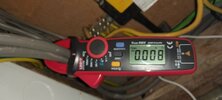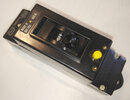Long time lurker but this is my first post here.
I’ve got a weird situation where I’ve got a voltage difference between the shower and the drain, and the bathroom sink tap and the metal drain plug. I’d appreciate some advice on what might be causing this, and what to do next.
I noticed in the shower earlier this week that I got a ‘tingle’ when lightly touching the chrome plated shower mixer. A cheap multimeter indicates that there is 2.5v AC between the shower mixer and the chrome plated drain in the shower tray. There is a similar 2.5v AC between the adjacent bathroom radiator and the shower drain. So basically any of the water or heating pipes and the drainage system.
The house is late 1990s, with a split load dual RCD board, on a TNCS supply. Every circuit is on a RCD, but there has never been any nuisance tripping. The gas and water are both brought into the house in plastic, but are bonded in 10mm as they enter the house regardless. There are no outbuildings and no metal pipes buried in the ground anywhere. All of the bonding is intact and connected at the MET.
Having let the drain/sink dry out for several hours the voltage reduces, which implies that the stream of water down the soil pipes is carrying the voltage. If it turn off the supply at the consumer unit the voltage disappears completely. The voltage caps out at 2.5v AC, even if I switch on some big loads like the kettle and range cooker.
It feels like the TNCS supply is floating above ‘true’ earth and the voltage is travelling through the soil pipes, but I don’t have the experience to diagnose this further. Presumably this isn’t normal and expected? Any guidance would be appreciated before I call out the DNO for something this is a non issue.
Many thanks in advance for any guidance or suggestions!
I’ve got a weird situation where I’ve got a voltage difference between the shower and the drain, and the bathroom sink tap and the metal drain plug. I’d appreciate some advice on what might be causing this, and what to do next.
I noticed in the shower earlier this week that I got a ‘tingle’ when lightly touching the chrome plated shower mixer. A cheap multimeter indicates that there is 2.5v AC between the shower mixer and the chrome plated drain in the shower tray. There is a similar 2.5v AC between the adjacent bathroom radiator and the shower drain. So basically any of the water or heating pipes and the drainage system.
The house is late 1990s, with a split load dual RCD board, on a TNCS supply. Every circuit is on a RCD, but there has never been any nuisance tripping. The gas and water are both brought into the house in plastic, but are bonded in 10mm as they enter the house regardless. There are no outbuildings and no metal pipes buried in the ground anywhere. All of the bonding is intact and connected at the MET.
Having let the drain/sink dry out for several hours the voltage reduces, which implies that the stream of water down the soil pipes is carrying the voltage. If it turn off the supply at the consumer unit the voltage disappears completely. The voltage caps out at 2.5v AC, even if I switch on some big loads like the kettle and range cooker.
It feels like the TNCS supply is floating above ‘true’ earth and the voltage is travelling through the soil pipes, but I don’t have the experience to diagnose this further. Presumably this isn’t normal and expected? Any guidance would be appreciated before I call out the DNO for something this is a non issue.
Many thanks in advance for any guidance or suggestions!



